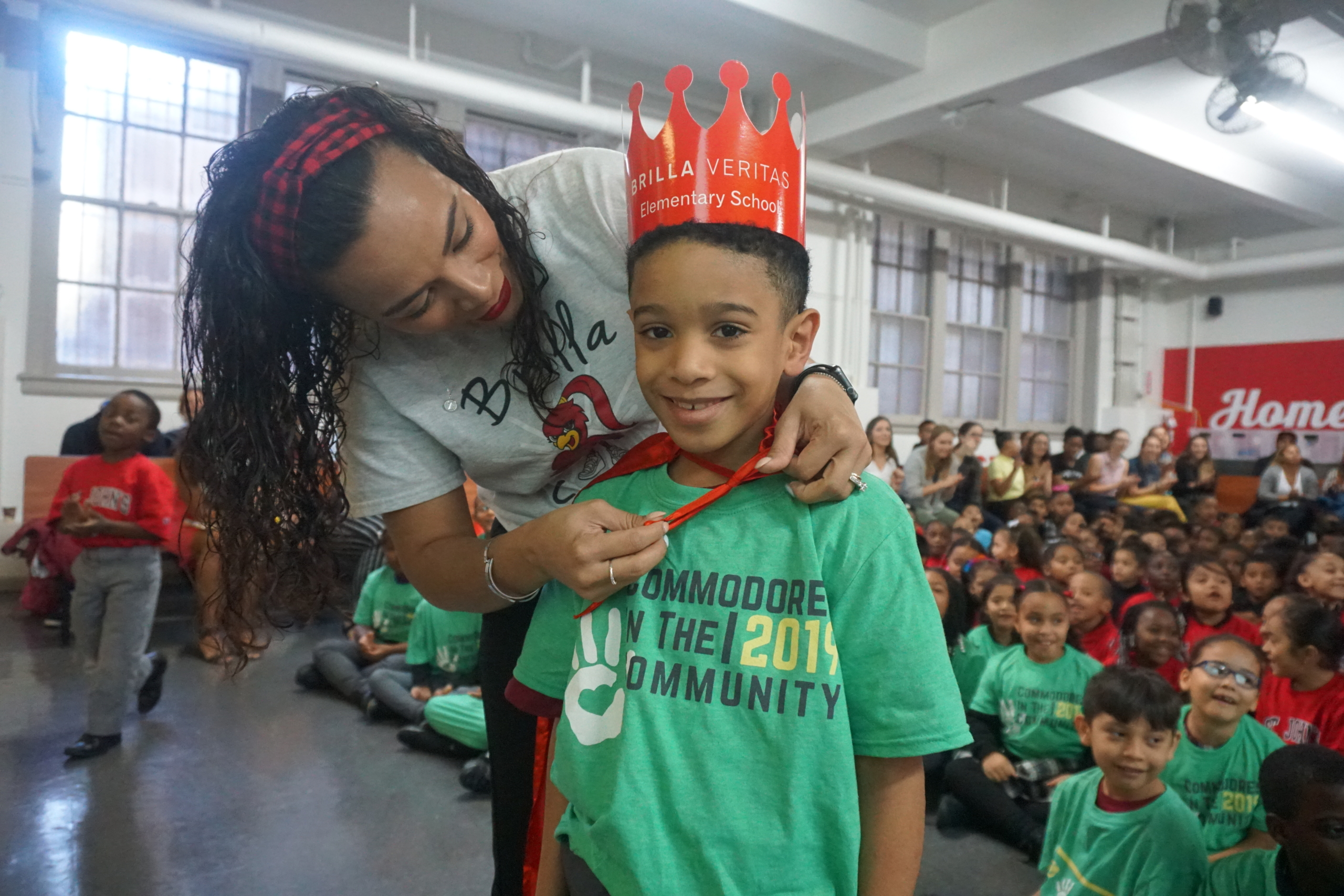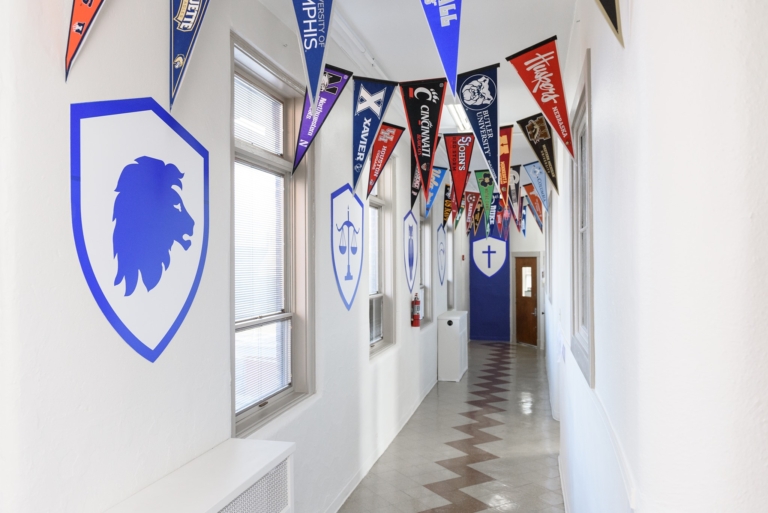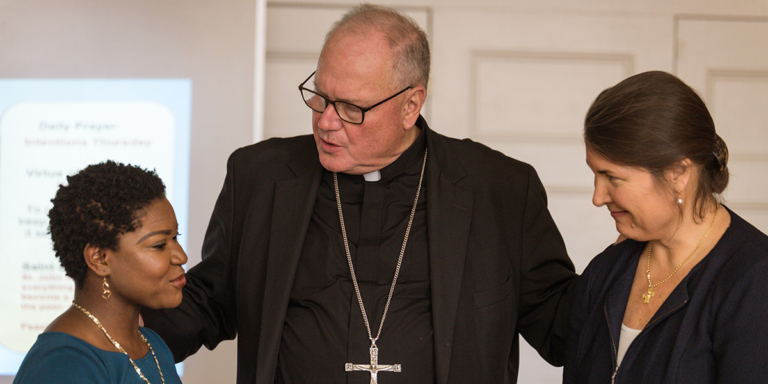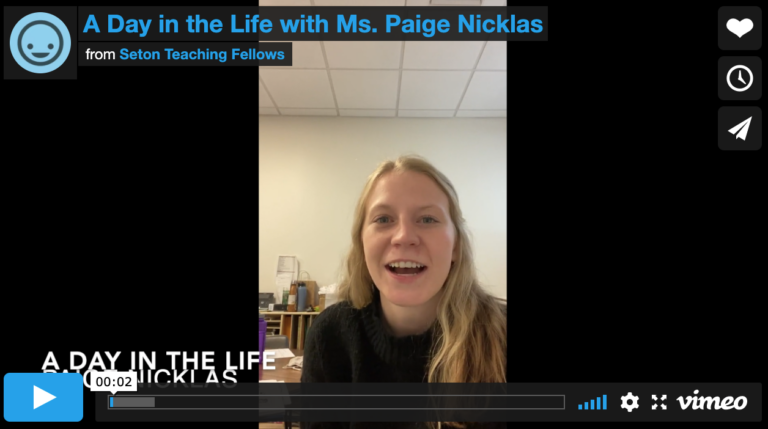Character education that encourages scholars and staff to grow in virtue is at the heart of how Seton Education Partners nurtures the whole person: mind, body and spirit. In fact, learning how to recognize and name the virtues is why many of our schools don’t stop with the cardinal virtues of Courage, Wisdom, Justice, and Self-Control, but emphasize seventeen sub-virtues that are infused across curricula and every aspect of school and community culture.

- Start with Dignity
At Seton, virtue education starts with acknowledging the dignity of every human person. We believe each person is meant to live a life of deep meaning and purpose, and it is when we develop the knowledge of who we are that virtue becomes about identity, not just behavior. When everyone in our schools—teachers, staff, students, families—is encouraged to put human dignity first, it serves as the doorway to all of the virtues. We are then able to “lead with love” and our learning communities operate in a healthy and holistic way.
- Acknowledge Families as the First Educators
Growing in virtue cannot be compartmentalized or separated from family life, which is why our schools exist to lift up parents and families so they can serve as the first educators of their children. Practically speaking, we support parents and their children through several programs, such as “Coffee and Conversations” and “Parent University” at our Brilla charter schools, and “Family Faith Nights” at Romero Academy at Resurrection and El Camino. The purpose of these programs is partnership. They are also an opportunity for families to tell us how we can better support their efforts to raise up young men and women of character.
- Practice Gratitude
Good character grows out of gratitude. At Seton we aim to make gratitude something we practice intentionally, in our schools and across our entire team. From celebrating Teacher and Staff Appreciation Week to the “shout out” bulletin boards at every Brilla campus that allow community members to praise the people they are grateful for, we recognize that intentionally saying “thank you” to those who make our work possible—and teaching our students to do the same—is central to becoming a virtuous person.
- Find Mentors
It’s no secret that children learn by observing adults and imitating their behavior, but we believe every person at every age benefits from mentorship and role models. That’s why our teachers and fellows pursue weekly professional development and have their own coaches.
- Value Free Choice
All families deserve choices when it comes to the educational options available to them. Yet our commitment to schools of choice goes even deeper; it is rooted in our conviction that human dignity requires freedom, and virtue cannot be coerced. Just as we reject the common belief that people’s worth is determined by what they produce, we also reject the view that human beings are determined entirely by their environment. Circumstances matter, and each person is ultimately the protagonist of his or her own life. The invitation to live an exceptional story is available to all!
- Pursue Enduring Truths
We believe there are objective moral truths and that an open mind is not an end to itself, but a means to finding truth. This journey of seeking truth is what education is all about and involves exploring cultures and time periods very different from one’s own. That is why our schools are classically inspired and every topic studied in the classroom is meant to enkindle curiosity in students and the desire to live a purposeful life grounded in truth.
- Cultivate Courage
C.S. Lewis wrote that “Courage is not simply one of the virtues, but the form of every virtue at the testing point.” As one of the cardinal virtues of classical antiquity, courage provides rich soil for students as they study heroic men and women in history and literature, as well as recent saints.
- Grow in Wisdom
We want all of our students to understand what truly matters and to be able to make thoughtful choices. We believe wisdom elevates individuals and communities, which is why our Brilla schools have a Shine Award for Wisdom given to a scholar who uses wisdom to make the best choices during academic work and in social settings, especially among peers. This scholar is a true leader in their teacher’s classroom.
- Work for Justice
In our community justice is fairness, giving to all what is owed to all and consistent with one’s dignity. The Shine Award for Justice at our Brilla schools is given to a scholar who treats everyone, no matter who they are, the way they would like to be treated. Even at a young age, these scholars seek to bring out the best in their friends and classmates, demonstrating true compassion and empathy for others.
- Deepen Self-Control
In a society that emphasizes comfort and convenience, self-control isn’t always the most popular virtue, but it is at the core of human flourishing. When children grow in self-control by actively monitoring their voice and body, they learn to consider their potential impact in the world while exercising power over their impulses. One tangible way our teachers at Brilla encourage students to develop self-control is through a powerful practice called the Quietest Moment of the Day.
- Magnify Faith
In addition to Courage, Wisdom, Justice and Self-Control, students at Romero Academy at Resurrection and disciples who participate in El Camino also seek to grow in the theological virtue of Faith. One of the most exciting resources Seton developed to support children on their faith journey is our El Camino Catechesis Curriculum, which uses stories from Scripture, imaginative fiction like The Chronicles of Narnia, and the lives of saints as models of virtue made flesh.
- Connect in Community
Seton schools and programs not only strive to form partnerships with the neighborhoods, parishes, and small businesses in the communities where they are located, we also believe the school itself is a microcosm of what a holistic and healthy community can look like. At our Brilla schools, for example, our team participates in “Proactive Circles”—safe spaces that allow people to connect and build healthy relationships by discussing potential problems before they even start. Our students imitate this model by participating in classroom “Community Circles” that create an engaging and common culture that encourages collaboration, risk-taking, respect, openness and empathy. We also foster connection on the Seton staff through Compañeros, providing staff an opportunity to pair off and meet once a month to support and pray for each other.



